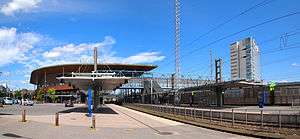Jyväskylä railway station
Jyväskylä | ||||||||||||||||||||
|---|---|---|---|---|---|---|---|---|---|---|---|---|---|---|---|---|---|---|---|---|
| VR station | ||||||||||||||||||||
 | ||||||||||||||||||||
| Location | Hannikaisenkatu 20, 40100 Jyväskylä | |||||||||||||||||||
| Coordinates | 62°14′27″N 25°45′13″E / 62.24083°N 25.75361°ECoordinates: 62°14′27″N 25°45′13″E / 62.24083°N 25.75361°E | |||||||||||||||||||
| Owned by | Finnish Transport Agency | |||||||||||||||||||
| Line(s) |
Turku–Joensuu Vaasa–Jyväskylä | |||||||||||||||||||
| Platforms | 4 | |||||||||||||||||||
| Tracks | 14 | |||||||||||||||||||
| Construction | ||||||||||||||||||||
| Structure type | ground station | |||||||||||||||||||
| Parking | yes | |||||||||||||||||||
| Bicycle facilities | yes | |||||||||||||||||||
| Disabled access | Yes | |||||||||||||||||||
| History | ||||||||||||||||||||
| Opened | 1897 | |||||||||||||||||||
| Rebuilt | 2002 | |||||||||||||||||||
| Electrified | 1980s | |||||||||||||||||||
| Services | ||||||||||||||||||||
| ||||||||||||||||||||
The Jyväskylä railway station or Jyväskylä Travel Center (Finnish: Jyväskylän matkakeskus) is located in the city of Jyväskylä, Finland. The station is also the city's main bus terminal for long-distance buses.
History
Passenger traffic started at Jyväskylä on 1 November 1897, when the railway track from Haapamäki was built and Jyväskylä was added into the Finnish railway network.[1] The track to Suolahti was opened in 1898, and later extended to Äänekoski and Haapajärvi.[1] Another line was opened to Pieksämäki in 1918.[1] The current track layout dates of 1977, when a new line was opened between Jämsänkoski and Jyväskylä to ease traffic between Haapajärvi and Jyväskylä.[2] Passenger traffic started on the new line in May 1978.[2]
The station building was built between 1896 and 1897 according to the style of the time, by the architect Bruno Granholm at the Finnish Railway Institute.[1] The station building represents national romanticist wooden architecture. The station included the stationmaster's quarters and a storage house. The station expanded with a restaurant designed by Thure Hellström in 1916.[2] In addition, two two-floor residential buildings with accompanying service buildings were built in 1921. The station building was expanded again in 1923 and from 1968 to 1969.
Visions of combining the rail and bus stations had already started during the 1980s, and a competition was held in 1995 to select the design for the future station.[2] The winning bid, collaborately designed by architect companies Harris & Kjisik and Petri Rouhiainen, was named Kannel as it was modeled after the Finnish instrument.[3] Work started in July 2011.[3] The new travel centre was opened on 2 December 2002 near the old station buildings,[2] which were converted into business, service and residential use. The old station is part of the Finnish contract to preserve historically significant station areas, and is part of the inventory of culturally significant areas of the Finnish National Board of Antiquities.[2][4]
Services
On the first floor, the travel centre offers services for both bus and rail passengers .[2] It also contains restaurants, small shops, a baby-care space and a passenger information system.
- Views of the station
- The station from the platforms.
 The old station building.
The old station building. The station from the outside.
The station from the outside. The station from the inside.
The station from the inside. Vr Class Vr2 steam locomotive no. 961 at Jyväskylä railway station in Jyväskylä, Finland
Vr Class Vr2 steam locomotive no. 961 at Jyväskylä railway station in Jyväskylä, Finland
See also
References
- 1 2 3 4 Iltanen 2009, p. 181.
- 1 2 3 4 5 6 7 Iltanen 2009, p. 182.
- 1 2 Nykänen, Sarlotta (2003). "Jyväskylän Matkakeskus". Projektiuutiset (in Finnish). RPT Docu Oy (1). ISSN 0786-8081. Retrieved 15 January 2012.
- ↑ "Asema-alueiden luettelo" [List of protected station areas] (in Finnish). National Board of Antiquities. 16 June 2004. Retrieved 21 July 2011.
Literature
- Vanhan aseman asemakaavan muutos (in Finnish). City of Jyväskylä.
- Iltanen, Jussi (2009). Radan varrella: Suomen rautatieliikennepaikat (in Finnish). Karttakeskus. pp. 180–182. ISBN 978-951-593-214-3.
External links
![]() Media related to Jyväskylä railway station at Wikimedia Commons
Media related to Jyväskylä railway station at Wikimedia Commons
- Jyväskylä Travel Center on VR's home page